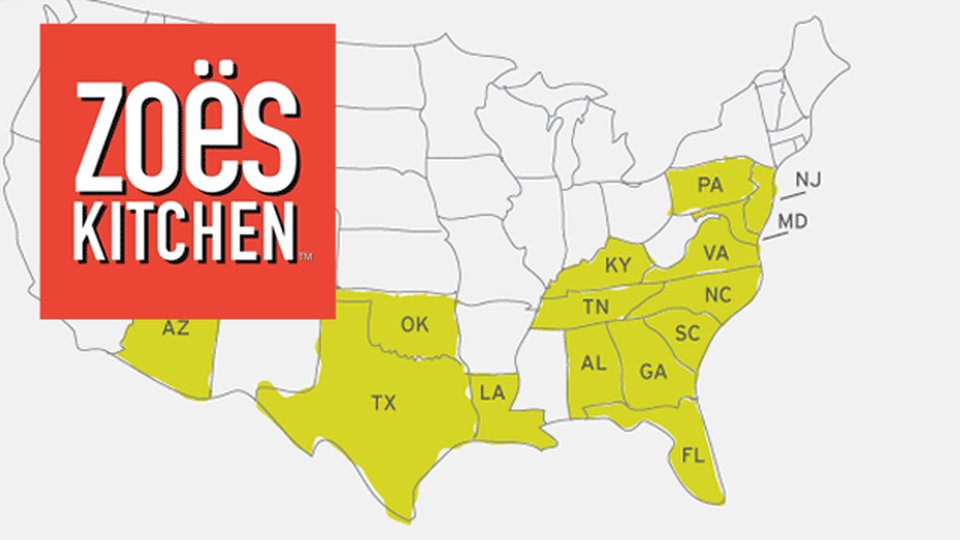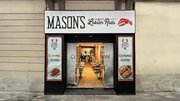Article
Is Zoës Kitchen poised for a breakout year?
Going public landed $42 million on the Mediterranean-inspired concept's balance sheet, and Zoës Kitchen is ready to put those dollars to work growing its footprint.

January 13, 2015 by Brenda Rick Smith — Editor, Networld Media Group
After going public last year, Zoës Kitchen could be poised for a breakout year in 2015.
 Kevin Miles
Kevin MilesThe company went public last April, raising approximately $87 million, says CEO Kevin Miles. About half of the amount was used to retire debt, and another $42 million made its way to the company's balance sheet, where it will be used to grow the brand in 2015 and beyond.
The Mediterranean-inspired concept's plans to open 30 – 32 company owned units this year, most in existing markets, explains Miles, though Zoës does plan to make its debut in Kansas City this year.
Zoës' growth strategy is to establish itself in a large market, then grow outward from that market in a two-hour radius around the city.
"You'll see us continue that strategy. It allows us to get some brand awareness in some of the major cities and it allows us to go into some of the smaller cities in the area," said Miles.
By the time the sun sets on 2015, Zoës hopes to have around 162 locations nationwide, a 24 percent increase over its current footprint..
Moving to company owned
Zoës closed out 2014 with 131 units across 15 states across the southern U.S., stretching from Arizona in the west up to Pennsylvania in the east. Of those, only one -- a restaurant in Louisville, Kentucky – is franchised.
The restaurant chain began as a family-owned concept in Alabama that focused primarily on lunch and some catering. Though early on the chain embracing franchising as a way to grow, a strategy change in 2009 has led the company to re-evaluate and buy back units.
Zoës began moving towards a dinner focus in 2009, explains Miles. Disposable places and utensils were replaced with real dishes and flatware, the lighting and atmosphere were upgraded and beer, wine and heartier dinner items made their way to the menu.
Those changes made Zoës a slightly more complex concept to execute, says Miles, so the company made a conscious decision to move away from franchising, at least for now.
"We could control the culture and the growth, and we could stage it for the right growth target," says Miles. "Zoës is not an overly complex concept, but it's all a fresh product, it's not a cookie-cutter franchise model as some other concepts might be, which takes a little bit different type of operator to come in and do that."
Adding dinner to the mix
The new emphasis on dinner seems to be working. AUVs have grown from 1.1 in 2009 to 1.5 in 2013, and most of that is coming from increased traffic during dinner rather than higher average check or price increases, according to Miles.
Zoe's current mix is 60 percent lunch and 40 percent dinner, up from a 75/25 split just a few years ago after the brands 17 percent catering mix is backed out of the equation.
"Our initiative has worked so far, our goal is to be 50/50," says Miles. Catering, part of the brand's heritage, has remained steady as a percentage.
Reaching the core customer
Zoe's new Mediterranean Family Meal, which rolled out in Q3 2014, seems positioned to help move more of the mix to dinner by resonating with the brands core audience: educated, affluent women on the hunt for better-for-you options to feed their families.
While Zoe's faces stiff competition from other fast casual restaurants, the main competition may be fresh markets and grocery stores which cater to customers looking for particular ingredients, says Miles.
Zoës is trying to provide a transparent option for families who might not always have the option to cook, but still want to know what they are putting in their bodies, he says.
Looking ahead
Consumers' desire for high-quality and/or better-for-you meal options should position fast casual restaurants well moving forward, Miles says. Customers are willing to pay more for food that they perceive is worth it to them.
"I think you're going to continue to see consumers demand transparency in product, and fast casuals are in a position to deliver on that," says Miles.
 ChatGPT
ChatGPT Grok
Grok Perplexity
Perplexity Claude
Claude












